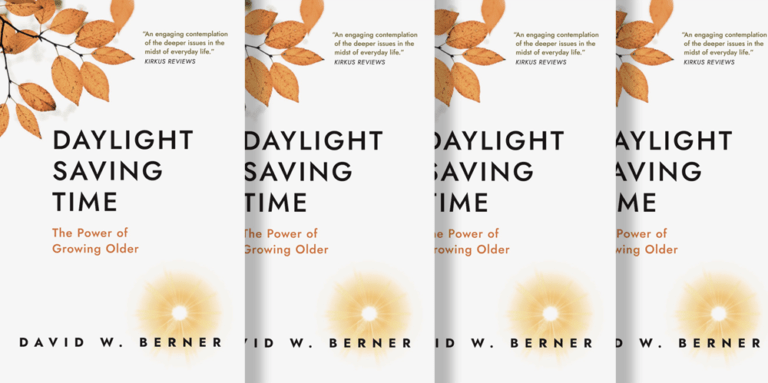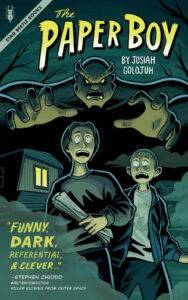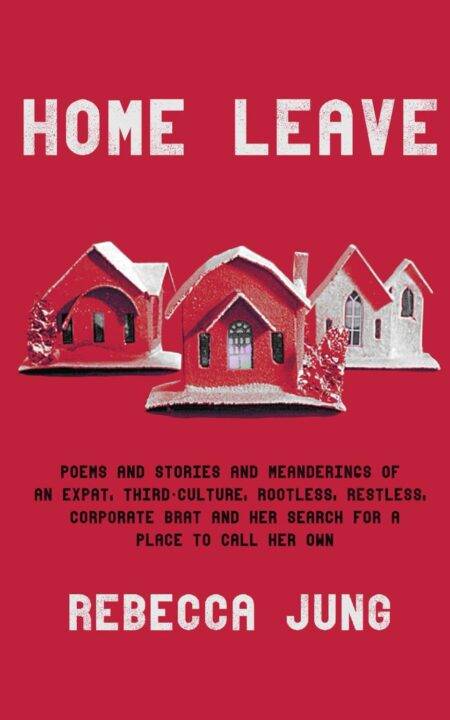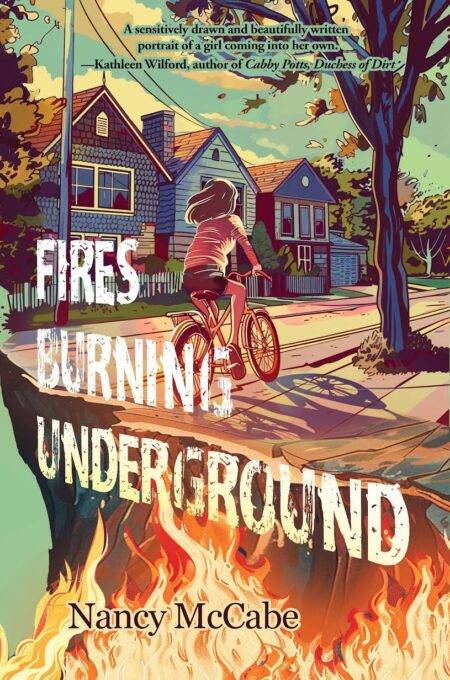Winner (Autobiography) London Book Festival 2024
From the Publisher: “When we are young, we think little about growing old. But time soon catches up with us: the first gray hair, a buckling knee, the purchase of reading glasses, or when a heart attack at the age of 56 rattles your world and reminds you that none of us gets out of here alive. In this meditative and intimate personal narrative on the act of aging, David W. Berner discovers how to accept and revel in the present, when the days that remain are fewer than those that have passed and offers a path for celebrating life’s final chapters. Through the lessons of seasonal change, the natural world, literature, and spirituality, Berner gives us a kind of instruction book on the art of growing older, challenging us to accept aging’s transformative powers. As a keen observer of the world, he forms a guiding philosophy on how to discover joy in the time we have left and nourishment in life’s remaining seasons.”
More info About the Author: David W. Berner grew up in the South Hills of Pittsburgh. He is a graduate of Baldwin High School and Clarion University, Clarion, Pennsylvania. He worked as radio journalist in Pittsburgh for several years before moving to Chicago. He has been honored as the Writer-in-Residence at the Jack Kerouac Project in Orlando and the Ernest Hemingway Birthplace Home and Museum in Oak Park, Illinois. Daylight Saving Time is his 12th book and is available now for pre-order.
“A candidly told, thought-provoking, important book.” —The Prairies Book Review
“The lovely prose and the ability to find meaning and pleasure in so many of his daily activities made this work feel like I was wrapping myself up in a cozy blanket. . . most of all, it made me wish this book hadn’t ended.” —Manhattan Book Review
“An authentic and touching memoir that delves into the complexities of aging, offering profound insights and heartfelt reflections on life’s journey.” —Book Excellence Review
“Daylight Saving Time is a fascinating read, (the author) writes with a gentle beauty and grace.” —Readers’ Favorite Review
“David W. Berner offers a contemplative memoir that navigates the themes of time, change, and self-reflection. . . a thoughtful examination of life’s impermanence.” —Literary Titan
“A touching, introspective exploration of life as we age . . . an exploration of what it means to truly live the beauty of life before it’s gone.” —Ryan Lindner, Author of The Half-Known Life: What Matters Most When You’re Running Out of Time
“An authentic and moving narrative with fittingly beautiful and powerful writing.” —International Review of Books
“A candid reflection on life . . . at a time when the trail’s end is closer than where it began.” —Midwest Book Review
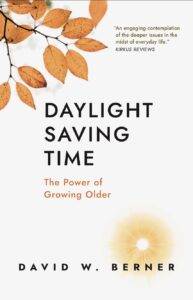 Southwest Pennsylvania is a great steel beam that holds me true, arrow straight and unbendable. If you grow up in a steel town, you stand upright and proud. Not prideful, just undeniably certain of where you come from. No pretense. No Hollywood. Steel town people have a hard-edged will, no gray in their truths. They will give you their very best if they know that you will do the same. If they are not deer hunters or bass fisherman, do not drink beer from long-neck bottles, or do not live and die by the sporting games grown men play, then they love someone who does. They prefer mountains to prairies, and rivers to oceans. They are raised in cold winters, and sticky summers, and beneath the ringing bells of churches where women wear hats and men wear ties, and little boys and girls hold out their hands and their tongues to take the holy wafer. Grandmothers live within walking distance. Fathers’ garages hold treasures—odd nails, strange screws, and hammers with carved wooden handles. Mothers’ kitchens never lose the aroma of coffee, a hot skillet, toasted bread, or salty broth. It is the America where the blue-collar man, the working class, was born. It doesn’t matter if you never toiled in a mill; it only matters that the ones before you did, big men who bulged from their shirts, who celebrated with a shot and a beer, who inhaled smoky air and then demanded their industrialist bosses find a better way, the men who insisted that the steel they produced also produced durable men who could live to love their families for a long time. Those unbendable beams—the real and the ones constructed in men’s souls—remain, holding up everything.
Southwest Pennsylvania is a great steel beam that holds me true, arrow straight and unbendable. If you grow up in a steel town, you stand upright and proud. Not prideful, just undeniably certain of where you come from. No pretense. No Hollywood. Steel town people have a hard-edged will, no gray in their truths. They will give you their very best if they know that you will do the same. If they are not deer hunters or bass fisherman, do not drink beer from long-neck bottles, or do not live and die by the sporting games grown men play, then they love someone who does. They prefer mountains to prairies, and rivers to oceans. They are raised in cold winters, and sticky summers, and beneath the ringing bells of churches where women wear hats and men wear ties, and little boys and girls hold out their hands and their tongues to take the holy wafer. Grandmothers live within walking distance. Fathers’ garages hold treasures—odd nails, strange screws, and hammers with carved wooden handles. Mothers’ kitchens never lose the aroma of coffee, a hot skillet, toasted bread, or salty broth. It is the America where the blue-collar man, the working class, was born. It doesn’t matter if you never toiled in a mill; it only matters that the ones before you did, big men who bulged from their shirts, who celebrated with a shot and a beer, who inhaled smoky air and then demanded their industrialist bosses find a better way, the men who insisted that the steel they produced also produced durable men who could live to love their families for a long time. Those unbendable beams—the real and the ones constructed in men’s souls—remain, holding up everything.
I think of my hometown’s hold on me as I walk the dog on this first day of March. The month is coming in like a lamb—sunshine and a consistent light breeze out of the south.
Before the day is over it will reach 60 degrees. My mother never missed noting the weather on March’s first day, reminding my sister and me of the mysteries of March. If it came in like a lamb, she warned, it would go out like a lion, and spring would have to wait. It is the birth of March that finds me swimming in the past, thinking of steelworkers and sportsman and shot-and-beer evenings and how I may not have carried on that tradition, yet it is deep inside me, tangled in the genes. The month of March and my mother’s warning of how the season would unfold have awakened a latent but irrepressible part of me. In my steel town you buried money on New Year’s Eve and cut a locket of hair on Good Friday for luck. You skipped school on opening day of the baseball season to go to Forbes Field to offer the Pirates the best chance of a great year. And on March 1, you wished for the roughest weather possible so that it would be assured that spring would come fully alive in four weeks. Hope. That’s what it was about. Hope for something better. Hope for a good life. If hope in a steel town was born out of working hard, choosing what was right, and praying on Sundays, then certainly wishing for an early spring in a month that could easily be the cruelest was a good way to live.
All of it mixes together on this first day of the month—the DNA test, the influence of family, faith, and steel, and today’s sun through the naked trees, tress that will hopefully burst with buds in the coming weeks and reject the adage about the snarling seasonal lion. Walking in the day’s quiet early hours, I am reminded that everything on my mind today will guide my tomorrow and all the days ahead, and the steel beams that hold me up, despite the rust, will remain indestructible, the rivets tight and strong, and I will look to what the end of March will bring.
This excerpt is published here courtesy of the author and should not be reprinted without permission.


